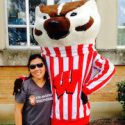Frances Corry and Ken Richardson: stories of triumph at UW-Madison
Frances Corry once worked with a woman who could use nothing but her chin; she attached a pencil to her chin and used the pencil to type data into a computer. Corry describes this woman as "the main reason I decided to go back to school and pursue my dreams. If she could overcome all the obstacles she faces, I can overcome mine."
Corry is one of two recipients of the Dean of Students Outstanding Undergraduate Returning Adult Student Award (OURASA) at the University of Wisconsin–Madison this year. In August, she'll complete her bachelor's in English, with an emphasis in creative writing, before moving on to graduate school in social work and theology.
Ken Richardson, this year's other ORASA recipient, tutored himself in math and English before putting aside his successful business career to become a returning adult student; he plans to pursue a doctorate in English and African American studies.
"The Returning Adult Student Awards are a celebration of how much one person can accomplish, but also of how a community can emerge in support of that person's dedication and courage," says Judith Strand, director of the Adult and Student Services Center in the UW–Madison Division of Continuing Studies (DCS), at a recent ceremony honoring OURASA recipients, 33 returning-adult and single-parent scholarship winners, and the accomplishments of adult students in general.
Provost Patrick Farrell thanked the many communities that come together to support these students: the donors who provide for the awards and scholarships; the family members; and the faculty and staff. Moved by the "story that got you here and keeps you here," Farrell also thanked the adult students for what they bring to the classroom and for continuing to "create their story" on campus.
The personal stories of the two OURASA recipients reflect the types of challenges and rich life experiences that adult students bring to their educational journeys.
Though Frances Corry has a language-learning disability and vision impairment and though she struggles with health issues, she has maintained a high grade point average throughout her college years, while also volunteering in her church and with young people, community elders and people with disabilities.
Before entering UW–Madison, Corry lived for three years on Native American reservations, first in Ontario and then in Manitoba, counseling and learning from a wide range of people. "I'm grateful to the elderly, the disabled, and all the other people who inspire us by their example," she says. "They are our teachers, our true leaders."
In addition to academic work and church/community service, Corry has already self-published a book: "Wisdom of the Elders" is in circulation at Oakwood Village Nursing Home in Madison (where she worked for many years) and among residents' families and churches. She's also writing a memoir about her childhood and her recent experiences living with Six Nations of the Iroquois in Ontario.
In the fall, she will begin graduate work at the University of Chicago School of Social Work and the Catholic Theological Union. She plans to become a Hospice chaplain and social worker, counseling the dying and their families, "possibly on a Native American reservation."
Corry also seeks to continue using her writing "to help change the attitude of society towards the elderly and dying. I want to write about what the Native American elders taught me about honoring the elderly and the continuance of life after death."
Ken Richardson believes that "continuing education also means making sure that education continues into the next generation. Whatever else I've accomplished, I hope I've planted a seed in my son so he doesn't face the same obstacles to an education that I did."
For Richardson, those obstacles included growing up in an environment with little value placed on education, and the fact that at an early age he was labeled "unable to learn in a formal sense." At age 36, he found himself vice-president of a successful electric supply business but holding a limited ability to read, write, or do simple arithmetic. Using a set of elementary-school workbooks, he set out to teaching himself basic skills in English and math. Next, he spent two years as a part-time student at Madison Area Technical College, building his self-confidence and discovering his own writing ability.
At 39, he entered UW–Madison as an undergraduate, majoring in English but also taking such difficult courses as physics, biology, and Latin. "While I'm obviously older than the traditional undergraduate student, I've rarely been the oldest one in a classroom-and I've never felt out of place. Being around students of typical college age makes me feel younger, not older," Richardson says.
Sharing the event with his wife, Ellen, a veterinarian in Mazomanie, and their three year-old son Ian, Richardson relates: "My favorite day of my own education so far was when I brought Ian with me to campus. He sat with me in the library just soaking up the atmosphere."
In addition to formal teaching in African American literature and English, he hopes to use his education in community service and "to expand and enhance discussions of race, to encourage understanding."
This year, almost twice as many nontraditional students as ever before are recipients of UW–Madison scholarships for returning adults and single parents. To provide support or learn more about returning adult students and services, visit http://www.dcs.wisc.edu/services, or call (608) 263-6960.

